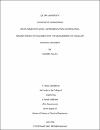DEVELOPMENT OF NOVEL INSTRUMENTATION INCORPRATING MAGNETORESISTIVE ENCODERS FOR THE MEASUREMENT OF ANGULAR
Abstract
As rotation dependent technologies emerge, the need of having a feedback about their rotational behavior became a necessity in order to control them. Many types of sensors, based on various operation principles are available in the market to provide such feedback. One of these sensors are sinusoidal magneto resistive (MR) type sensors. Such sensors have many merits over other angular position sensors, yet extracting the angle of interest, 𝜃, from their signals is not a trivial task as they encode the angle into two orthogonal sinusoidal signals. Furthermore, these signals also suffer from imbalances and imperfections in practice. Towards extracting the angle from the sensor signals and minimizing the effects of their imperfections, a thorough literature survey has been conducted to learn about the state of the art linearization techniques. Despite that the extraction of angle from the orthogonal sensor signals can be based on open loop or closed loop techniques, all of the work on MR sensors is based on open loop techniques. The latter methods are not as robust as closed loop techniques. Towards filling such gap, a novel closed loop technique based on the well-known Phase Locked Loop (PLL) technique is proposed. The enhanced PLL eliminates the need of analog multipliers; needed in the Phase Detector stage, through the exploitation of the resistive nature of the MR sensors. Subsequently, novel imbalance correction techniques are proposed to suit the proposed enhanced PLL converter. The theory of the proposed techniques is discussed in detail along with extensive simulations and practical implementation to test their performance. It is shown practically that the proposed enhanced PLL and imbalance correction techniques perform as expected, as the enhanced PLL technique showed identical performance to that of a classical PLL, and the proposed imbalance correction techniques successfully eliminated the present imbalances. Experimental results show that both proposed and classical PLL methods resulted in around 1.2° Peak-Peak error over the whole 360° range. The error was then shown to be caused by a 3rd harmonic distortion from the sensor’s side and not the proposed method.
DOI/handle
http://hdl.handle.net/10576/11348Collections
- Electrical Engineering [62 items ]


